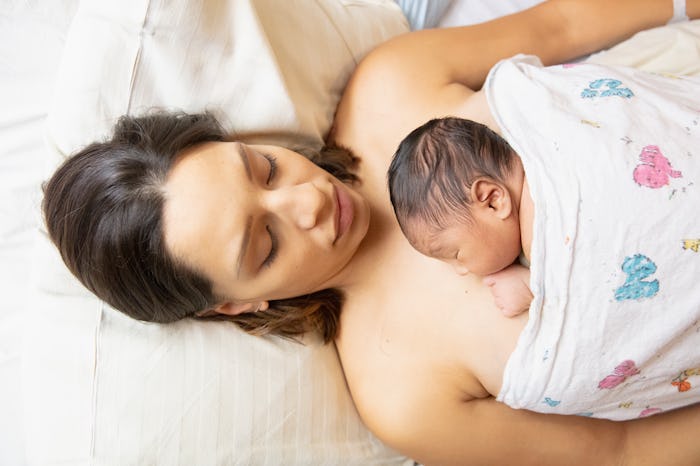Life

What Happens To Your Placenta After Giving Birth
After the hard work of delivering a baby, a mom deserves to do nothing but rest and snuggle with her newborn. But there's one more step before the process is over. The organ that helped your baby grow and thrive in the womb, the placenta, needs to come out. So what happens to your placenta after giving birth? Well, more contractions, more pushing, and eventually a delivery.
According to Baby Center, the placenta provides everything a baby needs over the course of your pregnancy. It brings nutrients in, keeps germs out, and attaches to your baby via the umbilical cord. Once the baby is born and the cord is cut, the placenta needs to come out next. Your doctor or nurse may help the process along by tugging on the remainder of the umbilical cord or by pushing down on your uterus, according to What To Expect. Once it's out, they'll need to look it over to make sure it's intact. It's important that it all comes out to avoid any complications. According to Belly Belly, a retained placenta can lead to hemorrhaging, fever, and problems producing breastmilk.
From there, what happens to the placenta depends on you and your hospital. Parents noted that if the placenta suffered any damage in delivery or appeared to have any abnormalities, it'll likely be sent for testing to make sure your baby isn't at risk for any developmental issues. According to Vice, some states may consider the placenta medical waste and dispose of it accordingly. Others may give women the option to take it home, but in many cases there's no clear cut answer. That means it's probably best to contact your hospital ahead of time if you're hoping to head home with your placenta in tow.
Hanging on to the placenta after birth seems to becoming more and more popular among new moms. According to Parents, some are choosing to eat the placenta either by dehydrating and encapsulating or blending it into smoothies (though you can of course just eat it raw, if you really want to). Some moms who do this believe that it'll help them heal faster, give them more energy, and help ward off postpartum depression. But many doctors are skeptical, noting that there isn't much scientific evidence to back up these claims, and that the process of cooking destroys most of the nutrients in the placenta anyway.
Eating the placenta isn't the only reason moms might want to hang on to it, however— some may see it as a keepsake of the most momentous day of their lives. According to mom.me, you can turn your placenta into an artsy print, jewelry, or even a teddy bear.